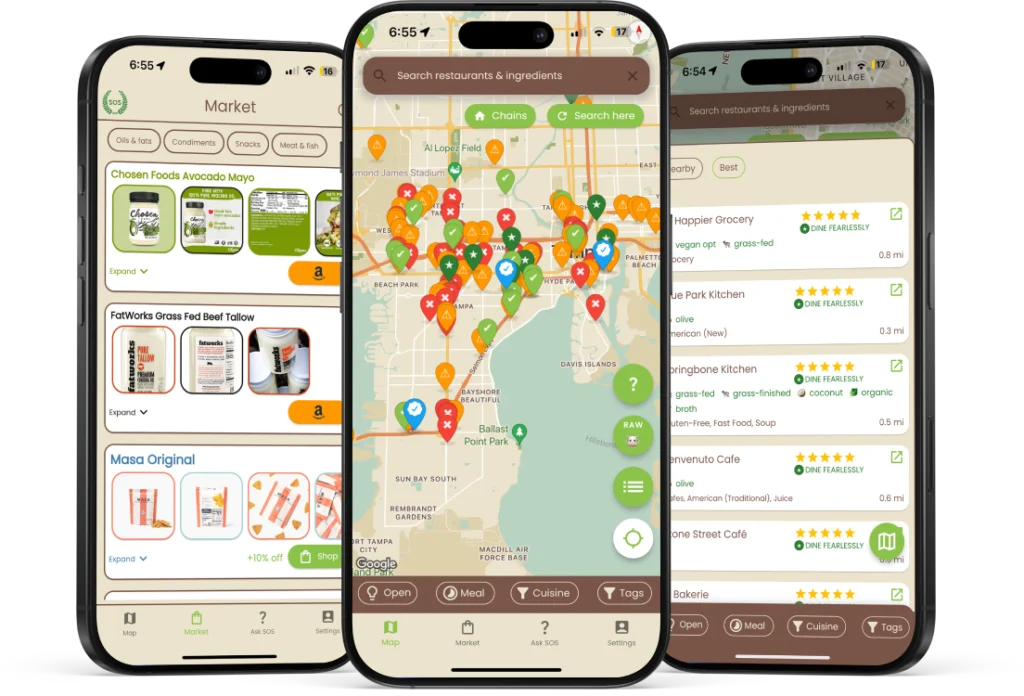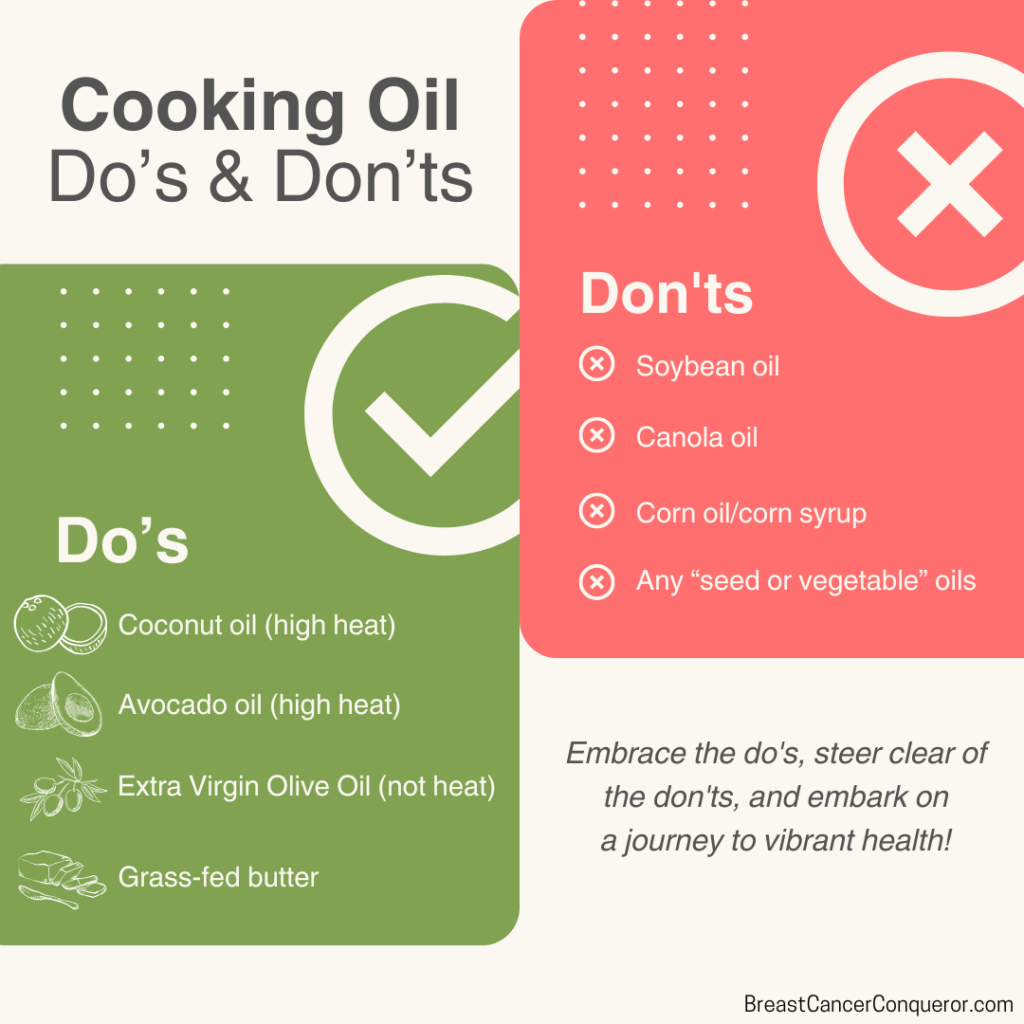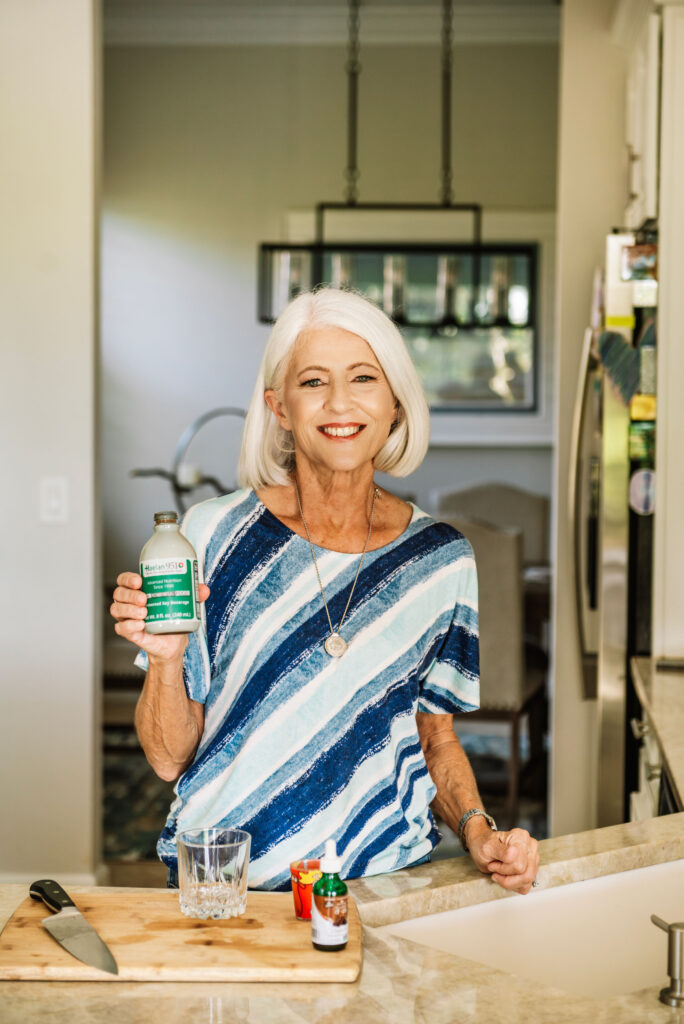Quick Read:
- Seed oils are incredibly toxic. Do NOT use soybean, sunflower, canola, rapeseed, corn, grapeseed, safflower, etc. oils.
- DO use nourishing oils such as coconut, avocado, and extra virgin olive oil.
- Use the Seed Oil Scout app to find restaurants that use healthy oils.
Being a Wellness Warrior is about living your biggest and most beautiful life! Instead of hiding out at home because you are worried about what is in restaurant food, you can now just check the Seed Oil Scout App [1], a community-driven map, before making a reservation. Call up the girls, get your boldest dress on, and go enjoy a lavish meal out on the town! Because after all, there’s a special magic in the healing power of female friendships [2]!

What Are Seed Oils?
One often overlooked yet significant factor is the TYPE of oils in our daily diet. Seed oils, commonly found in many restaurant dishes, have been under scrutiny for their damaging impacts on your body and mind. Many health experts say they are worse than cigarettes because of their potent amounts of chemicals, toxins, and omega-6 fatty acids (the bad type of omegas).
Side note: Don’t get confused!! The term “vegetable oil” is often used interchangeably with “seed oils,” but there is NOTHING healthy about “vegetable oils,” and they do not contain vegetables! It’s just another marketing term to trick you into thinking these oils are “good for you.”
Seed oils include:
- Soybean oil (most common, and we will clear up the confusion below)
- Sunflower oil
- Canola oil
- Rapeseed oil
- Safflower oil
- Corn oil
- Grapeseed oil
- Cottonseed oil
- Rice bran oil
These oils became popular in the mid-20th century because they were cheap to produce and had a long shelf life, but they are horrific for your health!

Why Seed Oils Are Super Toxic.
Seed oils are made from extracting oil from a tiny seed using chemicals like hexane, a solvent also used in glue and gasoline. We could stop there, because who would ever drink glue or gasoline? But we will continue to show you just how damaging seed oils are, and the super-easy swaps you can use that optimize your health and healing!
In addition to chemicals, seed oils are packed with inflammation from high amounts of omega-6 fatty acids (not to be confused with omega-3s [3], which are essential nutrients for brain health). While you need some omega-6s in your body, an imbalance of omega-6 vs. omega-3s (usually due to seed oils) leads to chronic inflammation, disrupting hormone balance, suppressing immune function, and promoting tumor development. To learn more about the inflammation and breast cancer connection, please read this blog post. [4]
We could go on and on about oxidative stress and many other harmful effects of seed oils, you get the point, so let’s get to the studies.
Recent breast cancer and seed oil studies.
In short, if you are trying to create an anti-cancer environment in your body, seed oils are working against you. Here’s the data:
- A 2024 study [5] from Cornell Medicine found that linoleic acid (abundant in seed oils) activated a pathway that accelerated tumor growth in mice with triple-negative breast cancer (TNBC). This effect was particularly pronounced in tumors expressing high levels of the FABP5 protein, which is found in some aggressive breast cancers.
- Many studies [6] have shown that high levels of dietary linoleic acid can increase breast cancer metastasis and reduce the effectiveness of chemotherapy.
- Seed oils disrupt cellular signaling and hormone metabolism, both of which are critical to estrogen-receptor-positive (ER+) breast cancer healing. (Study [7])
Soybeans, simplified.
Before we go on further, we must clear up the soybean confusion, as there’s a ton of misleading information around soy and estrogens. Soy can greatly help or harm your healing journey, especially if you are part of the 70-80% of women with estrogen receptor-positive (ER-positive) cancers. Since these types of cancers thrive in the presence of estrogen, especially toxic estrogen, anything that throws off your natural balance should be something to fully understand and be intentional about. Below is a quick summary; more details can be found in this blog post. [8]
Not all forms of soy and estrogen are the same! If you read nothing else in this section, please know these two things: [9]
[9]
- Fermented soy (Haelan 951 [9], organic miso paste (recipes [10]), pickled tofu, etc.) is HEALING, but soy isolates (GMO soybeans and soybean oil, soy protein powder, etc.) are harmful.
- Phyto-estrogens are HEALING, but xeno-estrogens are harmful. Please review this blog post [11] for details.
And now back to seed oils—and EASY and healthy solutions!
Simple Seed Oil Swaps.
The best thing you can do is just swap seed oils for healthy oils that pour goodness into your healing journey.
Oils we recommend for Wellness Warriors include:
- Olive oil. It can actually reduce rates of breast cancer by 68%. Learn why via this blog post. [12] Note: Olive oil should be for drizzling over food, not cooking with high heat.
- Avocado oil.
- Coconut oil. Also great to use as a body moisturizer and for oil pulling for oral health [13].
- Grass-fed butter.
When you don’t have control over your cooking, like when eating out, check the Seed Oil Scout app [1]! It’s designed to help you navigate the dining landscape by identifying restaurants that prioritize healthier cooking oils. The app offers a comprehensive, community-driven map of over 35,000 restaurants across major cities, detailing the types of oils used in their cooking. Some even share if they use organic produce!
Key features of Seed Oil Scout include:
- Detailed Restaurant Profiles: Gain insights into the cooking oils used, sourcing practices, and overall food quality of various restaurants.
- Community-Driven Reports: Benefit from real-time updates and reviews from fellow health-conscious diners.
- Seed Oil Safe Verification: Look for the blue checkmark indicating that a restaurant has been verified for using healthier cooking oils.
Download Seed Oil Scout [1] today and take control of your dining experiences! By making informed choices, you’re not only supporting your health but also advocating for a broader shift towards healthier cooking practices in the restaurant industry.
Your next read: Proven Ancient Wisdom: Olive Oil Is A Powerful Breast Cancer Healer [12]